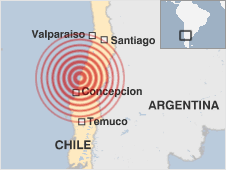A massive earthquake with a magnitude of 8.8 has struck central Chile, the country’s largest in 25 years.
The quake struck at 0634 GMT about 91km (56 miles) north-east of the city of Concepcion and 317km south-west of the capital, Santiago.
Chilean television is reporting 16 deaths so far. President Michelle Bachelet also said a large wave had affected one southern island group.
The US issued an initial tsunami warning for Chile, Peru and Ecuador.
That was later extended to Colombia, Antarctica and Central America. Japan’s meteorological agency warned of a potential tsunami across large areas of the Pacific.

Aftershocks
Ten deaths have so far been confirmed in Bio Bio, five in Maule and one in Araucania.
President Bachelet said a “wave of large proportion” had also affected the Juan Fernandez island group, reaching halfway into one inhabited area.
Map
She said if there were more aftershocks, people in coastal areas should go to higher ground.
Ms Bachelet warned people not to travel on roads in affected areas as a number of bridges were down.
She called on people to remain calm and contact the authorities if they needed help.
Many of Chile’s news websites and radio stations are not accessible.
Buildings in Santiago were reported to have shaken for between 10 and 30 seconds, with the loss of electricity and communications.
The US Geological Survey (USGS) said the earthquake struck at a depth of about 35km.
It recorded a 6.2 magnitude aftershock in the same area soon after at 0652 GMT and another of 5.5 magnitude about 84km from Santiago at 0819 GMT.
The USGS said tsunami effects had been observed at Valparaiso, west of Santiago, with a wave height of 1.69m above normal sea level.
One journalist speaking to Chilean national television from the city of Temuco, 600km south of Santiago, said many people there had left their homes, determined to spend the rest of the night outside. Some people on the streets were in tears.
Mark Winstanley, who contacted the BBC from Vina del Mar, 100km north-west of Santiago, said buildings had shaken and electricity and phone connections were cut but he could see no structural damage yet.
A university professor in Santiago, Cristian Bonacic, said that this was a massive quake but that the cities seemed to have resisted well. Internet communications were working but not mobile phones.
Chile suffered the biggest earthquake of the 20th century when a 9.5 magnitude quake struck the city of Valdivia in 1960, killing 1,655 people.
